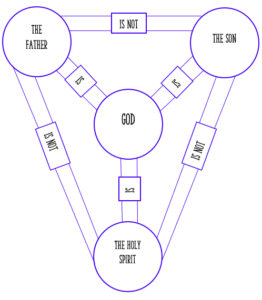Overview
So, if the word “Trinity” is nowhere to be found in the content of the Bible, why do Christians believe it? Simply put, Christians believe in the Trinity because the Bible teaches it, even though the actual word “Trinity” was not penned within its pages. To illustrate this, let me provide an example related to school. At the end of the semester, when a teacher is going over the content of the final exam, they may bring up a term that a student feels they have never heard of before: “binomial nomenclature.” “What!?” Nobody is raising their hand to ask the teacher what this means, in fear that they will be the odd one out. The class is filled with unease, as the teacher continues reading aloud the content that will be on the final test. When the time finally comes for the teacher to go over the term, the content is described: “Remember class, binomial nomenclature just means the naming of different species.” A sigh of relief erupts by the students. They knew the meaning of the term the whole time, even though the term itself seemed vastly unfamiliar. It is the same here. The word “Trinity” is not made known in the pages of the Old or New Testaments. Yet, reading from Genesis 1:1 to Revelation 22:21 supports its manifestation as a true Christian doctrine (teaching).
Historic Controversy
The profound nature of the Trinity has been a point of contention for many groups. For example, in the 4th century, there arose what became known as the Arian Controversy (1). At the center of this conflict was how people were to think of the deity of Christ. In the Council of Nicaea, a stand was taken against false teachings such as Arianism and misrepresentations that had creeped in, specifically concerning the relationship between the Father and the Son. This Council of Bishops, and the Nicene Creed that stemmed from it, did not create the concept of the Trinity. Rather, they recognized what was already evident in the Bible (2). Think of it this way: we cannot create time. We can only recognize that it is there. No matter what we think of it, we are not getting any younger. Does this mean that when time is given standards, that people are creating time itself? No, of course not. Instead, the applied standards serve as a recognition of what is evident. Therefore, rooted in history is not new insights or the development of what we ought to think of the Trinity. On the contrary, historic councils, creeds, and confessions have served as a recognition of what God has revealed to us in His Word. Such organized thoughts keep people’s minds focused on the beautiful flower of truth, even in the midst of the weeds of doubt and hostility.
“SUCH ORGANIZED THOUGHTS KEEP PEOPLE’S MINDS FOCUSED ON THE BEAUTIFUL FLOWER OF TRUTH, EVEN IN THE MIDST OF THE WEEDS OF DOUBT AND HOSTILITY.”
What The Bible Says
Genesis 1:2 – The presence of the Spirit
Isaiah 43:10 – There is only one God
Isaiah 9:6 – Christ described as both a child and The Mighty God
John 1:1 – Jesus (the Word) identified as God
John 8:24 – Jesus says if we do not believe He is God (Greek words: ego eimi refer to the I AM statement), we will die in our sins
Matthew 3:16-17 – Relationship of Trinity expressed
Matthew 28:19 – The Great Comission given with reference to Trinuity
Acts 5:3-5 – Holy Spirit identified as God
Philippians 2:5-8 – Christ equal with God
This does not serve as an exhaustive list, but these verses serve as a very good starting point for understanding the Trinity as expressed in the Bible.

The Conclusion
So, why is this important? The Trinity is where the rubber meets the road, so to speak. It illuminates the differences among many religions and groups. A person who is a Muslim will say that they believe in Jesus. A person who is a Mormon will say that they believe in Jesus. A person who is a Jehovah’s Witness will say that they believe in Jesus. Yet, they are all using the same language to express different ideas.
The doctrine of the Trinity, and ultimately the Bible itself, clashes with the ideas that Jesus was only a prophet or that he is a created being (even if He is the first to be created). On the other hand, the teaching of the Trinity affirms that Jesus is Himself God the Son, existing in coeternity and coequality with God the Father and God the Holy Spirit. Jesus, being both fully God and fully man, has the power to save as only He can do (John 8:24). The Bible is clear: there is only one true God. Furthermore, the Father is identified as God, the Son is identified as God, and the Holy Spirit is identified as God. The doctrine of the Trinity affirms that the one true God exists as three Persons.
Quick disclaimer: To say that the Bible teaches the Trinity does not imply that all of the early, 1st century Christians, or Christians throughout history could perfectly expound upon it. Even so, the triune nature of God has always been a reality. We may not fully comprehend it, but it is a beautiful truth that we as Christians must accept, profess, and uphold; not just because it is historic, but because it is Biblical; and because it is Biblical, it is a truth that God has revealed to us (John 17:17). We do not have to completely understand something to hold fast to the truth of the matter. For example, we know that in the beginning, God created the heavens and the earth. Yes, and Amen! How did He do this? I cannot comprehend that. Still, I know it is true. May we stick to the truth, even in the face of our own questions and uncertainties. In essence, may we choose to love the mystery.
